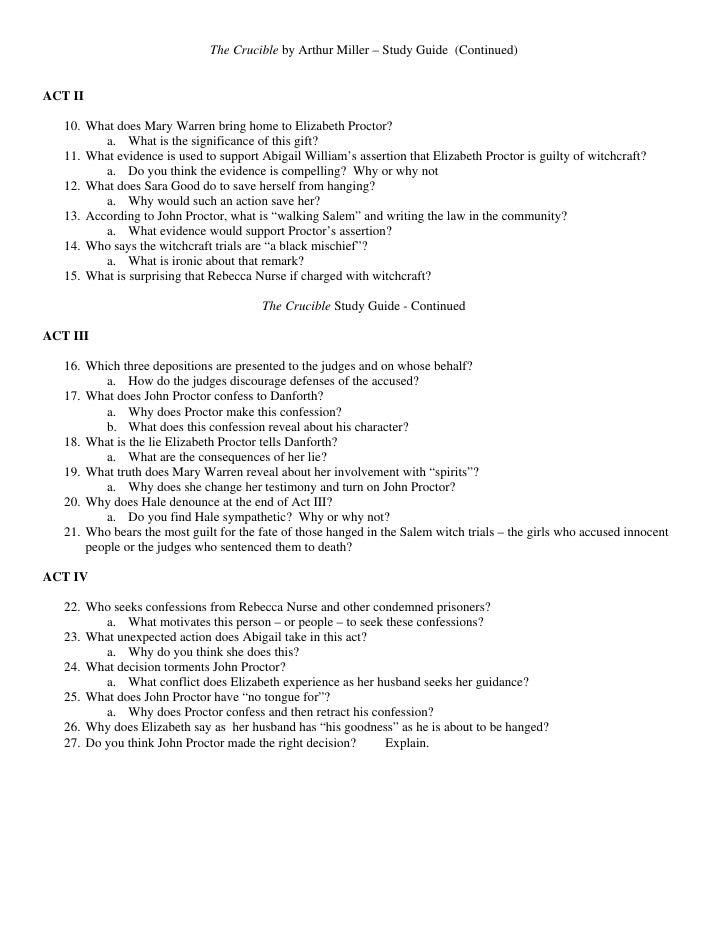Crucible Study Guide Answers Characters
Discuss the role that grudges and personal rivalries play in the witch trial hysteria. The trials in The Crucible take place against the backdrop of a deeply religious and superstitious society, and most of the characters in the play seem to believe that rooting out witches from their community is God’s work. However, there are plenty of simmering feuds and rivalries in the small town that have nothing to do with religion, and many Salem residents take advantage of the trials to express long-held grudges and exact revenge on their enemies., the original source of the hysteria, has a grudge against Elizabeth Proctor because Elizabeth fired her after she discovered that Abigail was having an affair with her husband,. As the ringleader of the girls whose “visions” prompt the witch craze, Abigail happily uses the situation to accuse Elizabeth and have her sent to jail. Meanwhile, Parris, a paranoid and insecure figure, begins the play with a precarious hold on his office, and the trials enable him to strengthen his position within the village by making scapegoats of people like Proctor who question his authority. Among the minor characters, the wealthy, ambitious Thomas Putnam has a bitter grudge against Francis Nurse for a number of reasons: Nurse prevented Putnam’s brother-in-law from being elected to the Salem ministry, and Nurse is also engaged in a bitter land dispute with one of Putnam’s relatives. In the end, Rebecca, Francis’s virtuous wife, is convicted of the supernatural murders of Ann Putnam’s dead babies.
Thus, the Putnams not only strike a blow against the Nurse family but also gain some measure of twisted satisfaction for the tragedy of seven stillbirths. This bizarre pursuit of “justice” typifies the way that many of the inhabitants approach the witch trials as an opportunity to gain ultimate satisfaction for simmering resentments by convincing themselves that their rivals are beyond wrong, that they are in league with the devil. How do the witch trials empower individuals who were previously powerless? Salem is a strict, hierarchical, and patriarchal society.
The men of the town have all of the political power and their rule is buttressed not only by law but also by the supposed sanction of God. In this society, the lower rungs of the social ladder are occupied by young, unmarried girls like Abigail, Mary Warren, and Mercy.

Powerless in daily life, these girls find a sudden source of power in their alleged possession by the devil and hysterical denunciations of their fellow townsfolk. Previously, the minister and the girls’ parents were God’s earthly representatives, but in the fervor of the witch trials, the girls are suddenly treated as though they have a direct connection to the divine. A mere accusation from one of Abigail’s troop is enough to incarcerate and convict even important, influential citizens, and the girls soon become conscious of their newfound power.
In Act II, for instance, Mary Warren defies Proctor’s authority, which derives from his role as her employer, after she becomes an official of the court, and she even questions his right to give her orders at all. Even the most despised and downtrodden inhabitant of Salem, the black slave Tituba suddenly finds herself similarly empowered. She can voice all of her hostility toward her master, Parris, and it is simply excused as “suggestions from the devil.” At the same time, she can declare that she has seen “white people” with the devil, thus (for the first time in her life, probably) giving her power over the white community. As the fear of falling on the wrong side of God causes chaos during the brief period of the hysteria and trials, the social order of Salem is turned on its head.
How does John Proctor’s great dilemma change during the course of the play? Proctor, the play’s tragic hero, has the conscience of an honest man, but he also has a secret flaw—his past affair with Abigail.
The Crucible Study Guide Answers And Questions

Her sexual jealousy, accentuated by Proctor’s termination of their affair, provides the spark for the witch trials; Proctor thus bears some responsibility for what occurs. He feels that the only way to stop Abigail and the girls from their lies is to confess his adultery. He refrains for a long time from confessing his sin, however, for the sake of his own good name and his wife’s honor. Eventually, though, Proctor’s attempts to reveal Abigail as a fraud without revealing the crucial information about their affair fail, and he makes a public confession of his sin. But by the time he comes clean, it is too late to stop the craze from running its course, and Proctor himself is arrested and accused of being a witch. At this point, Proctor faces a new dilemma and wrestles with his conscience over whether to save himself from the gallows with a confession to a sin that he did not commit.
The Crucible Study Guide Answers Act 3 And 4
The judges and Hale almost convince him to do so, but in the end, he cannot bring himself to sign his confession. Such an action would dishonor his fellow prisoners, who are steadfastly refusing to make false confessions; more important, he realizes that his own soul, his honor, and his honesty are worth more than a cowardly escape from the gallows. The official sat study guide second edition. He dies and, in doing so, feels that he has finally purged his guilt for his failure to stop the trials when he had the chance.
As his wife says, “he have his goodness now.”.